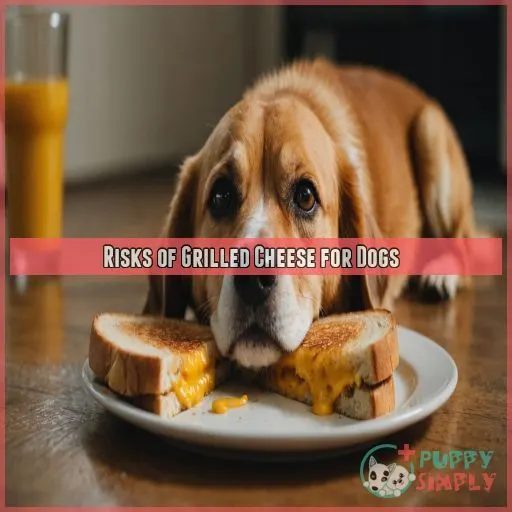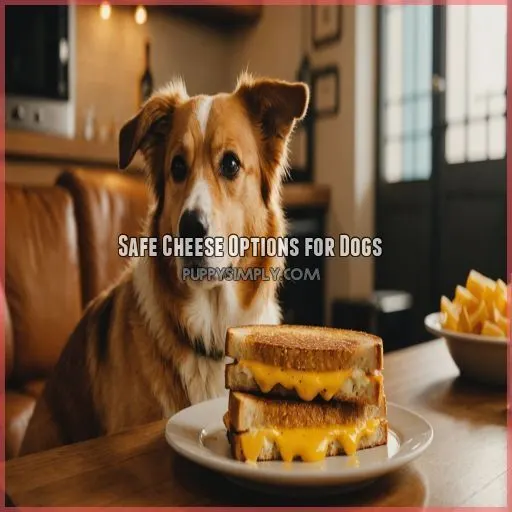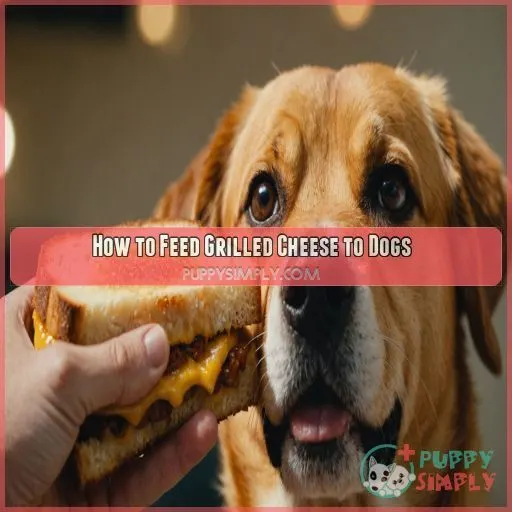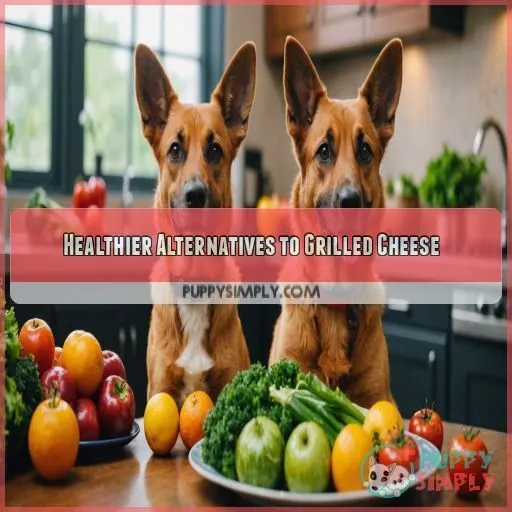This site is supported by our readers. We may earn a commission, at no cost to you, if you purchase through links.
 Grilled cheese might make your dog drool like a broken fountain, but think twice before sharing.
Grilled cheese might make your dog drool like a broken fountain, but think twice before sharing.
While they can nibble a small piece without harm, this cheesy delight isn’t exactly a dog’s best friend.
Packed with fat and lactose, it can lead to weight gain, tummy troubles, or even pancreatitis, especially in schnauzers and spaniels.
If your dog’s diet’s in need of cheesy love, opt for safer choices like lactose-free or low-fat cheese instead.
Toss in a small amount as an occasional treat, not a daily dish.
Curious about the best cheesy options for your furry friend? Keep reading for more tail-wagging tips.
Table Of Contents
Key Takeaways
- Before you share your grilled cheese with your pooch, remember it’s not just a sandwich for them – it’s a potential tummy tornado. Too much cheese leads to weight gain and digestive drama, so let’s keep it to an occasional nibble.
- If your dog’s a schnauzer or spaniel, be extra cautious. They’re more prone to pancreatitis, and grilled cheese is an express ticket to Vet Bill Island.
- Some dogs channel their inner rock band after eating cheese – hello, gas and fireworks! If lactose intolerance is the culprit, swap out for lactose-free or low-fat cheeses to keep the peace.
- The next time you’re tempted to share, think of cheese as a once-in-a-while treat, not a main dish. Stick to dog-safe cheeses like goat cheese or cottage cheese. Keep things moderate and you’ll have a happy, health-friendly hound.
Risks of Grilled Cheese for Dogs
While grilled cheese may seem like a tasty treat for your pup, it’s important to understand the potential risks. Feeding your dog too much cheese can lead to obesity, pancreatitis, digestive issues, and even allergic reactions. It’s really important to approach cheese with caution and moderation in terms of your canine companion’s health.
Obesity and Weight Gain
Grilled cheese might give dog food a run for its money in deliciousness, but it can weigh down your pup’s waistline. Overindulgence can lead to obesity, messing with their calorie needs and health.
- High in calories
- Lack of exercise worsens gain
- Sneaky snacks add up
- Dogs can’t hit the gym
- Vet bills are no walk in the park
Pancreatitis in Certain Breeds
Just like the risk of gaining a few extra pounds, certain dog breeds skirting around grilled cheese might face pancreatitis. Breeds predisposed include schnauzers and spaniels who may experience symptoms like vomiting. Diagnosis and treatment should be handled by your vet. Prevention is as simple as moderation! Remember, your pup’s health isn’t worth risking over a cheesy temptation.
| Symptom | Diagnosis | Treatment |
|---|---|---|
| Vomiting | Vet Analysis | Medication |
| Weakness | Blood Tests | Dietary Changes |
| Abdominal Pain | Ultrasound | Fluids |
Lactose Intolerance and Digestive Issues
Just like us after a hearty Thanksgiving feast, some dogs might experience tummy troubles with cheese. Those lactose intolerance symptoms—gas, diarrhea, or a rumbly tummy—signal potential cheese digestion issues. To dodge these problems, consider dairy-free alternatives or homemade treats. Remember, Sparky’s smile should be about fun, not stomach woes! Keep those doggy milk allergy markers in mind.
Allergic Reactions to Dairy
While some dogs can enjoy small amounts of cheese as a treat, others may suffer from dairy allergies or intolerance.
If you notice any reactions, it’s best to avoid dairy and switch to a vet-approved, dairy-free diet for your furry friend’s health and safety. Learn about surimi risks.
Watch for signs like itching, rashes, vomiting, or digestive issues after your pup indulges in grilled cheese.
Can Dogs Eat Cheese Safely
While cheese can be a tasty treat for your dog, it’s important to know how to do it safely learn about sodium levels for dogs. Opt for lactose-free or low-fat options to keep your furry friend’s tail wagging without the tummy troubles!
Lactose-Free Alternatives for Dogs
Ever thought about dog-friendly lactose-free cheese brands? It’s wise to treat your pup without the tummy turmoil, opting for dog milk alternatives or homemade dairy-free recipes. Goat vs. sheep milk might sound baa-zarre, but it works! Yogurt for dogs? Woof not! It’s a paws-itively delightful lacto-friendly choice. Remember, moderation is key—too much could lead to trouble!
Low-Fat Cheese Options for Dogs
You’ve chosen lactose-free cheese, but how about low-fat options? Your pup’s waistline will thank you! Consider these benefits:
- Low-fat cheese brands help manage weight.
- They reduce risk of dog cheese allergies.
- Perfect for homemade low-fat recipes.
- Excellent for picky eaters who might be cheese connoisseurs.
Benefits of Small Amounts of Cheese
While cheese may not be a dietary staple, small amounts can actually benefit your pup! The calcium and protein provide a healthy boost, supporting strong bones and muscles. Plus, the healthy fats can even lift their mood. Just be sure to choose low-fat options and monitor portions to avoid any tummy troubles. (Source)
Safe Cheese Options for Dogs
If you’re thinking about cheese for your furry friend, not all options are created equal, and some can lead to tummy troubles. Stick with healthier choices like goat cheese or cottage cheese and steer clear of the processed stuffyour pup will thank you with wagging tails and less mess on the carpet!
Goat Cheese as a Safer Option
Goat cheese can be a safer option for your dog, offering nutrition benefits while limiting potential issues. Dogs can typically digest it easier than cow’s milk cheeses. When treating Fido to some goat cheese, consider:
- Small Portions: Moderation keeps tails wagging.
- Mix Wisely: Pair with other dog-friendly foods.
- Watch for Allergies: Monitor for reactions.
Goat cheese—a delightful dog-friendly delight!
Cottage Cheese as a Healthy Choice
If your dog’s feeling gouda with cheese but you’re worried about their waistline, cottage cheese is a healthy choice. It’s low in fat, making it perfect for weight-conscious pups. Packed with calcium, it gives a beneficial boost, especially for picky eaters. Remember, though, moderation is key—you don’t want your pup to embrace their inner cheese puff!
Avoiding Processed Cheeses
If you’re thinking about feeding your pup cheese, steer clear of processed cheeses. These often contain a laundry list of additives and preservatives that can upset your dog’s delicate digestive system. Instead, opt for natural, minimally processed cheese varieties like cottage cheese or goat cheese. Your furry friend will thank you with a happy, healthy tummy!
- Avoid processed cheese with long ingredient lists
- Look for natural, minimally processed cheese options
- Cottage cheese and goat cheese are great choices
- Homemade cheese treats are a healthy alternative
- Processed cheese can cause digestive issues in dogs
How to Feed Grilled Cheese to Dogs
Feeding your dog a grilled cheese sandwich sounds like a delicious idea, but you’ll want to do it carefully to avoid any tummy troubles. With the right approach, including moderation and keeping an eye on any signs of digestive issues, you can occasionally share this cheesy treat with your furry friend.
Moderation and Portion Control
Now that you know safe cheese options, remember moderation is key! Think of cheese as a sprinkle of joy, not the main course. Those puppy eyes may beg for more, but stick to small dog treat sizes. Healthy snack options prevent overfeeding dangers. Portion control tips, like limiting treat frequency, help keep your pooch healthy and happy!
Pairing With Dog Food for Balance
After mastering moderation, you can pair grilled cheese with dog food for a nutritional balance. Here’s how:
- Dog food ratios: Mix a small piece of grilled cheese with regular food.
- Cheese portioning: Keep portions bite-sized.
- Feeding frequency: Treat it like dessert, not the main course.
This way, your pup stays healthy and wagging!
Monitoring for Signs of Digestive Issues
When feeding your pup grilled cheese, keep a close eye out for any tummy troubles. If Fido starts experiencing diarrhea, vomiting, gas, or a lack of appetite, it’s time to take a break from the cheesy goodness. Talk to your vet to make sure your dog’s digestive system can handle dairy without discomfort.
Healthier Alternatives to Grilled Cheese
If your pup’s longing eyes are fixated on your grilled cheese, worry not because there are healthier alternatives that they can enjoy. Skip the greasy treats and consider nutritious cheese dog snacks that keep their tails wagging without the tummy troubles caper safety tips.
Nutritious Dog Treats With Cheese
You want to treat your furry friend, and while grilled cheese mightn’t be the answer, there’s plenty of nutritious dog treats with cheese. Consider homemade snacks, ensuring you avoid cheese allergy risks. Use cheese sparingly—after all, moderation is key. These treats cater to puppies and senior dogs, keeping tails wagging without adding extra pounds!
Homemade Cheese Recipes for Dogs
Want to pamper your pup with tasty dog cheese recipes? Skip the chef’s hat and whip up a simple cheese treat in your kitchen. Mix grated low-fat cheese with oats and an egg to create pup-safe cookies. Keep those suspicious cheese ingredients minimal and watch out—Fido will be howling for more of these healthy cheese snacks!
Cheese-Based Snacks for Dogs With Sensitivities
For dogs with cheese sensitivities, consider homemade cheese-based snacks made with lactose-free or low-fat cheese varieties. These can satisfy your pup’s craving for cheesy goodness without upsetting their tummy. Try cottage cheese or goat cheese mixed with healthy ingredients like peanut butter, sweet potatoes, or carrots for a delicious and digestible treat.
Frequently Asked Questions (FAQs)
What ingredients in grilled cheese are harmful to dogs?
Wondering what’s in grilled cheese that could harm your pup? The culprits are the cheese, butter, and bread – all high in fat and calories that can upset a dog’s stomach, especially if they’re sensitive to ingredients. Why risk it? Stick to dog-safe snacks instead.
How often can dogs eat cheese?
When treating your furry friend, it’s best to limit cheese to small amounts occasionally—like a surprise party for their taste buds! Too much can lead to weight gain and tummy troubles, so practice moderation (Source).
Is lactose intolerance common in dogs?
Dogs can’t always stomach cheese—lactose intolerance is pretty common. If Fido’s been downing grilled cheese and then plays the tuba in the gas section or leaves surprises on the carpet, cut the cheese!
Can grilled cheese cause allergies in dogs?
Giving your pup grilled cheese can lead to allergies because of the lactose in cheese. It’s like you serving dairy at a lactose intolerant family reunion; it’ll lead to itching, vomiting, or tummy troubles in dogs .
Do certain dog breeds handle cheese better?
While some dog breeds may tolerate cheese better than others, it’s generally best to avoid feeding your pup grilled cheese. The high fat and sodium content can upset their tummy. Stick to dog-friendly treats instead!
Conclusion
Imagine this: if life were a VHS tape, you’d rewind and rethink handing Fido that grilled cheese.
While it’s tempting, can dogs eat grilled cheese? Yes, but with caution.
A nibble won’t hurt them, but there are healthier cheese options to treat your pup.
Stick to low-fat or lactose-free varieties, and always practice moderation.
Your dog will dance with joy, and you’ll have peace of mind knowing you’ve kept their wagging tail happy and healthy.











